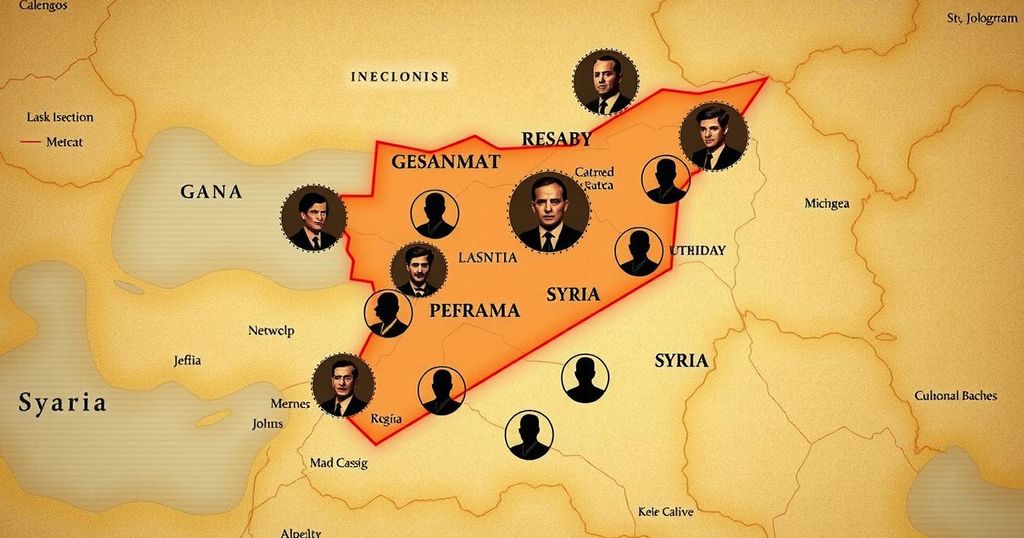Rubio Addresses Gaza Deportation, Syria’s Instability in Senate Hearing
During a Senate hearing, U.S. Secretary of State Marco Rubio clarified that the U.S. is not considering deporting Gazans to Libya, while noting a willingness to discuss voluntary relocation with other countries. He reported the resumption of food shipments to Gaza, although UN aid has yet to reach those in need. Addressing Syria, he warned of the government’s instability and risk of civil war, emphasizing a need for careful U.S. engagement with new leadership despite significant challenges.
U.S. Secretary of State Marco Rubio testified before the Senate Foreign Relations Committee on Tuesday, addressing various pressing issues including the situation in Gaza, the Iran nuclear negotiations, and foreign aid reforms in Syria. Notably, he clarified that deporting Gazans to Libya is not a policy currently on the table. The U.S. has, however, approached other regional countries about the possibility of accepting Gazans who choose to leave the enclave on a voluntary basis.
Rubio specified, “What we have talked to some nations about is if someone voluntarily and willingly says I want to go somewhere else for some period of time… are there countries in the region willing to accept them?” Importantly, he confirmed that Libya was not part of these discussions. The Secretary expressed satisfaction over resumed food shipments to Gaza, noting additional trucks are expected to follow soon. Yet, he acknowledged complications on the ground, with humanitarian aid not yet reaching the people in Gaza.
The concern remains, as highlighted by UN spokesperson Stephane Dujarric, who remarked, “Today, one of our teams waited several hours for the Israeli green light to access the Kerem Shalom area… Unfortunately, they were not able to bring those supplies into our warehouse.”
On the topic of nuclear negotiations with Iran, Rubio shared the administration’s vision to establish a civil nuclear energy program in Iran while preventing uranium enrichment. He emphasized, “It will not be easy, but that’s the process we’re engaged in now.” The Trump administration sees this as a potential pathway to prosperity and peace for Iran.
Another focal point of discussion was the precarious situation in Syria. Rubio mentioned Trump’s ambitions to lift sanctions on Syria just one week after a meeting between the President and Syrian leader Ahmed al-Sharaa. He warned senators that the new Syrian regime faces numerous challenges and may be closer to collapse than anticipated.
Rubio asserted the urgency of collaborative efforts with the new Syrian government, highlighting that without assistance, Syria might spiral into a full-blown civil war. He offered insights into Syria’s diverse population, where various groups including Sunni, Shia, Christians, and Kurds once coexisted peacefully, until the Assad regime exacerbated divides.
Concerns linger regarding the trustworthiness of President Sharaa, who has previously been linked to al-Qaeda. Rubio stated, “These new figures running Syria would not pass a background check with the FBI.” The administration will need to navigate these complicated waters carefully as it seeks to establish dialogue with the new leadership in Syria.
Rubio’s statements garnered attention, especially regarding the risk of imminent civil war in Syria. However, he posited that it is crucial to engage with the new government, which is central to Trump’s foreign policy direction. Trump’s proactive diplomacy style is evident in his decision to meet Sharaa and potentially ease sanctions.
Moreover, the Trump administration’s approach faces significant opposition domestically. Sanctions, like an oil tanker, do not change course rapidly. The EU’s recent decision to ease sanctions could lend support to Trump’s policies, yet resistance remains strong within Washington. While support for Sharaa is emerging regionally, including backing from Saudi Arabia and Turkey, grave challenges persist at home.
In Syria, incidents of unrest continue, and various armed factions including remnants of ISIS threaten stability. The local administration is aiming to unify security efforts while also managing foreign fighter presence. Additionally, pressures from Israel to demilitarize the borders complicate control efforts for Syria’s new government, which struggles to maintain order amidst smuggling and internal dissent.
All these factors underline the sharply complex landscape facing Rubio and the U.S. administration as they contemplate future strategies in the region. Rubio’s remarks provide a valuable framework for understanding why U.S. engagement in Syria is necessary, lest the country veer further into chaos or align with anti-Western entities.
In summary, Secretary of State Marco Rubio’s testimony highlighted the complexities of U.S. foreign policy regarding Gaza, Iran, and Syria. While emphasizing the importance of voluntary refugee options for Gazans and the resumption of food shipments, he also reflected on the stalled humanitarian efforts in Gaza. Rubio’s warnings about potential civil war in Syria showcased the urgent need for U.S. engagement with the transitional government and the intricate challenges posed by both regional and domestic politics. The situation remains precarious, with strong implications for U.S. foreign policy and regional stability.
Original Source: www.jpost.com




Post Comment